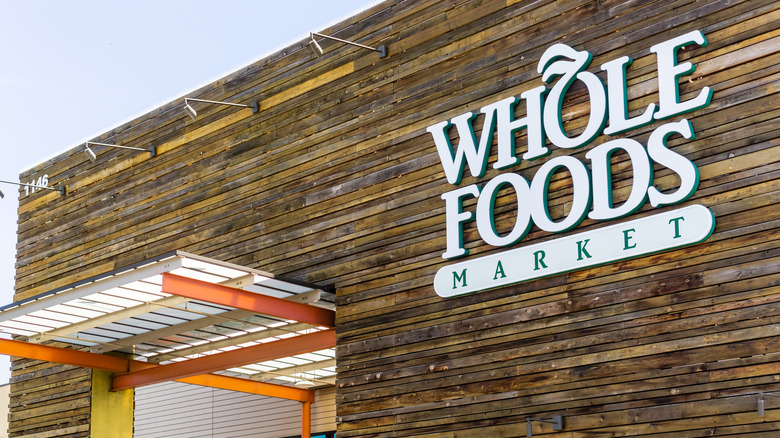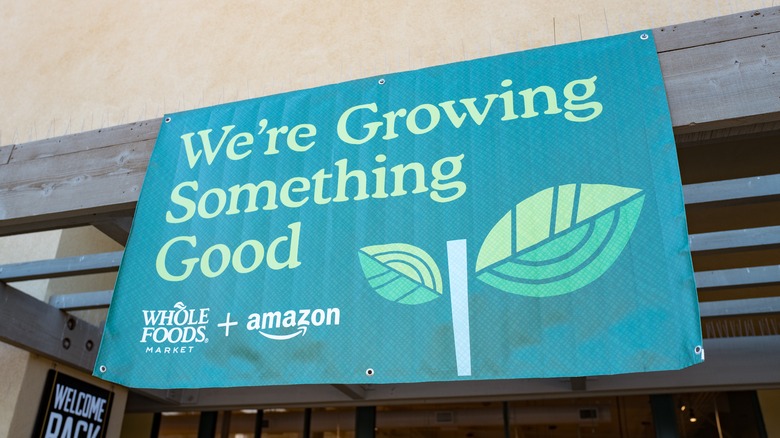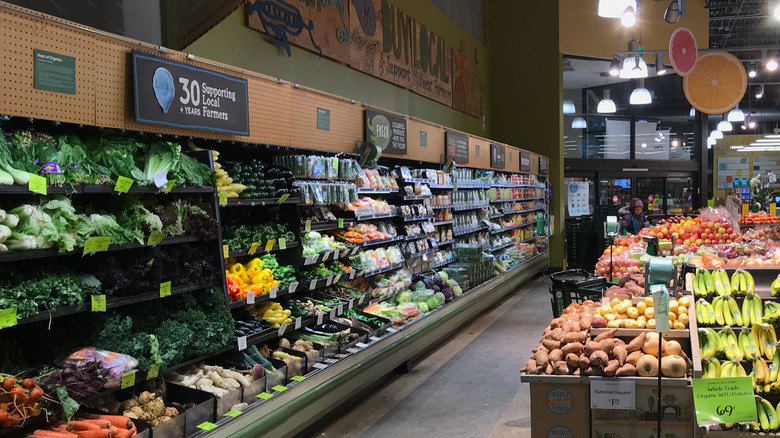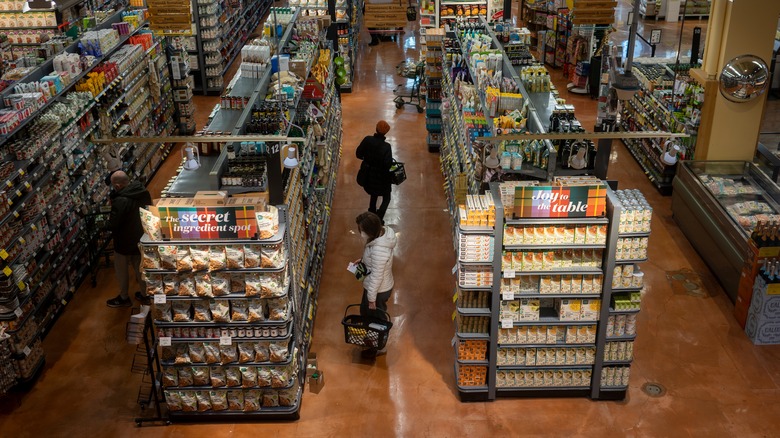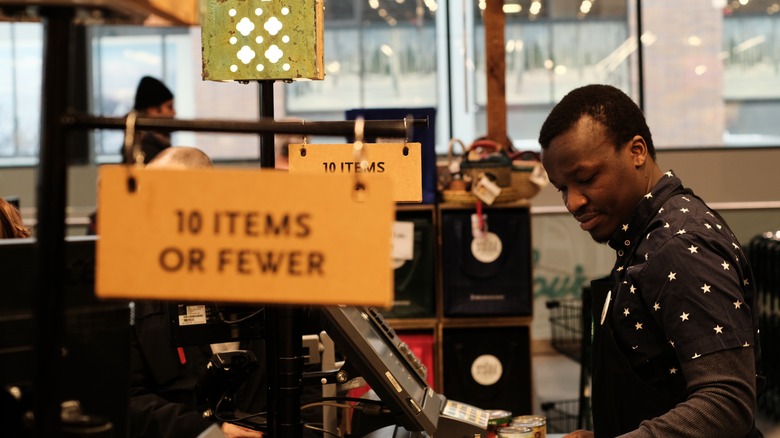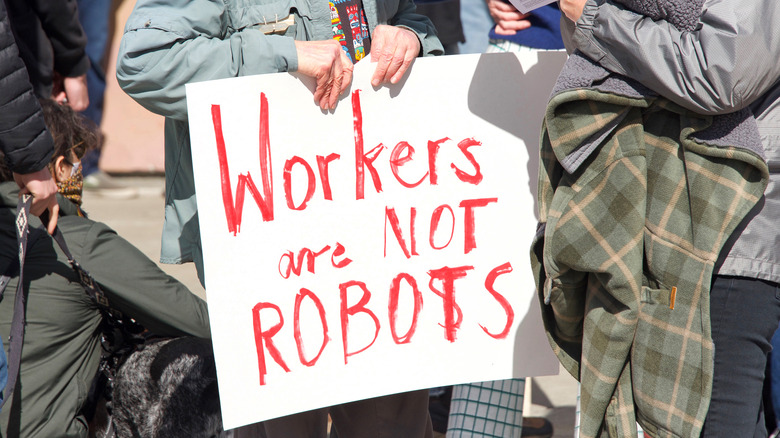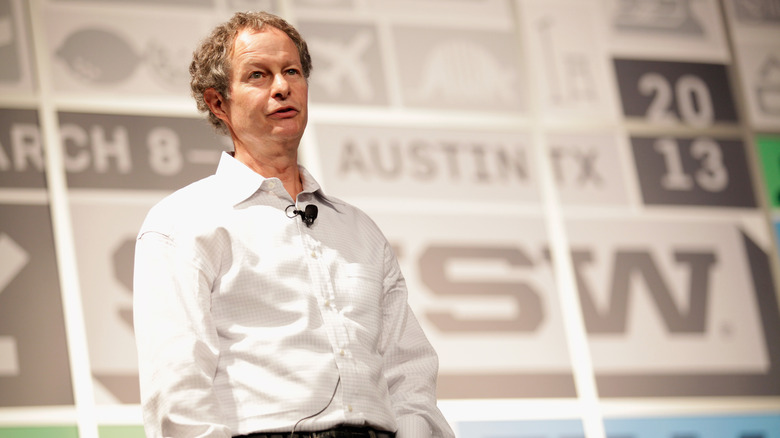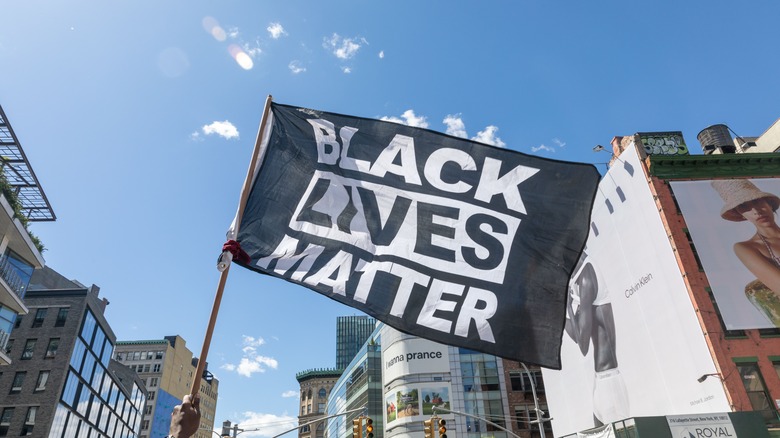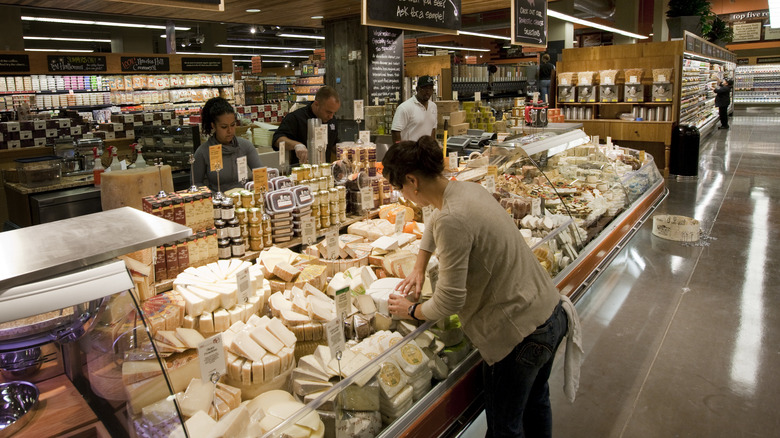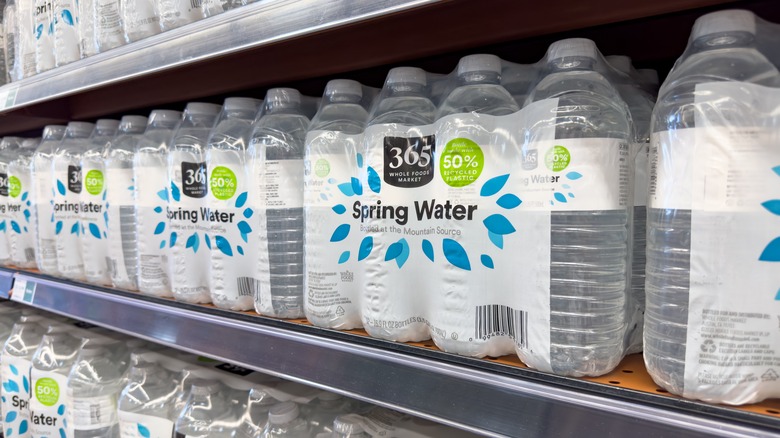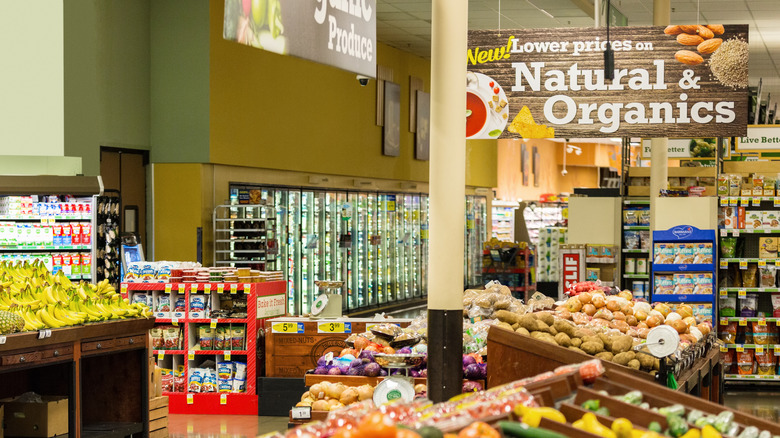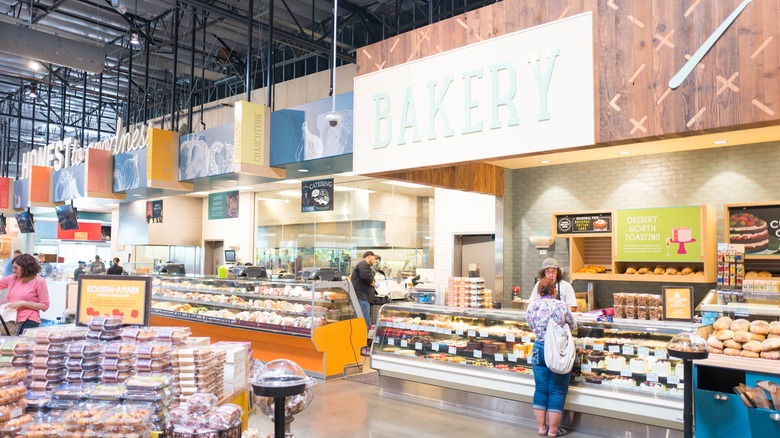The Not-So-Wholesome Reality Of Whole Foods Market
Take a trip back in time when the first Whole Foods Market opened in 1980 and you'd experience a small, independent grocery store championing small farmers and producers, and selling organic food. This was virtually unheard of in the early '80s and set the store apart from its competitors, beginning its journey to the huge chain it is now. But, today, there's a not-so-wholesome reality behind Whole Foods Market. It isn't the friendly neighborhood store it once was — rather it's part of a huge conglomerate.
If you've been thinking that Whole Foods Market is still the underdog, just wait until you learn who owns it. And think it's sustainable and always supports small farmers? Well, you've got a nasty surprise coming your way. That's before we even get to employment issues and various other scandals the chain has been embroiled in.
So, anyone shopping at Whole Foods Market to avoid supporting a huge corporation should reevaluate things. We're going to examine the truth behind this supposedly eco-friendly and ethical grocery chain so you know who you're really giving your money to. It might not be any worse than shopping at Walmart, but it's no better — and it will cost you a lot more.
Whole Foods is owned by Amazon
Whole Foods Market was once an independent chain but it has been under Amazon's umbrella since 2017. That's why you can buy some of Whole Foods' 365 line at Amazon. While this acquisition has brought certain conveniences, such as streamlined delivery options and integration with Amazon's technology, it's definitely not a wholesome move. Many ethically minded shoppers have raised concerns about the implications of shopping at a store owned by a corporate giant like Amazon.
One of the issues is that Amazon's vast scale overshadows small, independent suppliers, squeezing them out of the market. This consolidation might mean fewer opportunities for local farmers and artisans. Amazon has an extremely bad track record with workers rights. It fights unions and underpays employees. Conditions can be dangerous for employees, with a greater rate of injuries in its warehouse workers and delivery drivers compared to people working in similar roles for other companies. That's before you even get to its carbon emissions and its tax-dodging ways.
All this leads to concerns over the potential dilution of Whole Foods Market's original ethos. None of this aligns with the values that the chain seemed to value. Many customers were drawn to the chain for its emphasis on quality, sustainable sourcing, and a strong connection to community health. Under Amazon's ownership, there's a fear that profit-driven decisions could compromise these standards.
Whole Foods pretends to be more sustainable than it is
Whole Foods Market has built its reputation on a promise of sustainability, with sleek marketing campaigns that emphasize organic, local, and eco-friendly practices. However, critics argue that the store's sustainable image is more about style than substance. Despite its glossy portrayal as an ethical store, measurable data suggests that some competitors, such as Aldi, actually deliver better environmental performance. So, really, Whole Foods makes you think it's more sustainable than it really is.
Aldi's supply chain and business model, for example, centers around efficiency and minimal waste. By streamlining operations, reducing packaging, and maintaining a lean product range, Aldi achieves a smaller carbon footprint and less food waste compared to the Whole Foods Market. Whole Foods' upscale image and focus on premium, locally sourced products certainly resonate with ethical consumers, yet the underlying practices sometimes fall short when put to the test of sustainability metrics. High energy consumption across numerous store locations and the complexities of managing a diverse supplier network can dilute the positive impact Whole Foods aims to project.
So, next time you think you should shop at Whole Foods more often because it's a sustainable choice, you should question whether it really is more sustainable or it just wants you to think that. Being owned by Amazon means that sustainability is no longer a core concern, and even if the chain itself has some sustainable practices, these are negated by its parent company's polluting ways.
A shift to centralized buying has left less space for regional brands
Whole Foods Market has been shifting its operations toward a centralized business model, a move that has raised concerns for regional brands and local farmers. In a centralized model, purchasing and product selection decisions are made by a head office rather than by individual store managers. This means that instead of each region curating products that reflect local tastes and produce, decisions are made by a corporate team looking to make the chain more efficient and increase profits.
While centralization can streamline operations and reduce costs, it also strips away the local flavor that once made Whole Foods special. Regional brands and local farmers thrive on relationships built through decentralized buying practices, where store-level buyers could support locally produced items. With the new model, these suppliers may find it harder to meet the broader, one-size-fits-all criteria imposed by a central office. As a result, local products that once gave stores more variety might be sidelined in favor of large-scale, standardized options that align with national trends.
This change is an issue because it does away with the platform that local producers once had. Getting a regional Whole Foods contract was once seen as a stepping for small producers not yet ready to move into national production. It also means you're less likely to see regional specialties and hyper-local produce in stores, which is a loss.
Whole Foods has been accused of overcharging customers
Whole Foods Market has faced serious allegations of systematically overcharging customers. And it's not just a one-off glitch — multiple investigations have pointed to a pattern of mislabeling that leads to inflated prices. For instance, back in 2015, the New York City Department of Consumer Affairs uncovered widespread inaccuracies in the weighing and labeling of pre-packaged foods at Whole Foods stores. Inspectors found that items like meats, dairy, and even baked goods were consistently recorded at weights that didn't match reality, resulting in customers paying extra.
The scandal reached a tipping point when Whole Foods was forced to settle with NYC, agreeing to pay $500,000 and implement rigorous in-store audits to ensure pricing accuracy. Customers weren't shy about voicing their frustration, with many vowing to boycott the chain for what they saw as deceptive pricing practices. And it wasn't only New York — other states, like California, also took notice. Investigations there led to hefty penalties, with the chain having to cough up to settle cases.
For many consumers, these repeated incidents have reinforced the store's "Whole Paycheck" reputation. While these cases happened around 10 years ago, it's still a reputational hit that's sticking with the company. It makes consumers second-guess whether they're really getting what they're paying for or if it would be better to shop elsewhere.
Whole Foods employees complain of being overworked and underpaid
On the outside, Whole Foods might seem like the kind of company that cares about its workers. However, numerous employees have voiced concerns about being overworked and underpaid. It paints a picture of a company struggling to live up to its ethical promises, and it's not the kind of thing many conscious consumers want to support.
Workers in many Whole Foods stores claim that the pressure to maintain high standards in a fast-paced environment often comes at the expense of a healthy work-life balance. They report long hours, understaffing, and an increased workload, especially in the wake of cost-cutting measures implemented after the Amazon acquisition. In 2021, paid break times were reduced from 15 minutes to 10 minutes, hardly giving workers time to grab a snack.
This seems to be in contrast to the brand's image of nourishing both people and the planet. Instead of being a harmonious workplace dedicated to promoting organic and sustainable values, many team members feel that the company is more focused on profit margins than on employee wellbeing. The truth isn't part of the wholesome image the store wants to portray.
A longtime Whole Foods CEO believed an odd government conspiracy
John Mackey, co-founder of Whole Foods Market and longtime CEO who stepped down in 2022, once made headlines for his controversial and offbeat political commentary. In one memorable instance, Mackey suggested a hidden government conspiracy was at work. He claimed that socialists had stealthily taken over the reins of power. According to his wacky theory, policies that appeared to favor expanded government control were part of a calculated takeover by socialist elements.
Mackey argued that these supposed socialists were undermining the very free-market principles that his company, and countless other American enterprises, had long championed. He maintained that what many saw as progressive policy changes were actually deliberate moves to transform the economy, imposing restrictions that he believed would hurt innovation and individual freedom.
The ex-Whole Foods CEO also caught flack from Gen Z by ranting about how they don't have the work ethic of previous generations. Considering the accusations about long hours and unrealistic workloads at the chain, it's hardly a surprise that younger workers aren't happy with conditions. Everyone deserves to have a healthy work-life balance and it seems that Mackey has lost sight of that.
Whole Foods repeatedly faced allegations of racism
Whole Foods Market has faced multiple allegations of racial discrimination that challenge its wholesome image. In 2019, a federal lawsuit was filed by Jaleel McFadden, an employee who claimed that the company's promotion policies systematically discriminated against Black employees seeking advancement. McFadden, who began his career as a baker in 1997 and rose to associate store team leader by 2007, alleged that despite his extensive experience, he was repeatedly overlooked for store team leader positions in favor of less-experienced white colleagues.
In 2020, during the height of the Black Lives Matter (BLM) movement, Whole Foods disciplined employees for wearing BLM masks and attire. The company cited a longstanding dress code prohibiting visible slogans unrelated to the company. However, employees argued that the dress code had been inconsistently enforced, pointing out that other non-company-related messages had previously been tolerated. This led to a class-action lawsuit alleging racial discrimination and retaliation. A U.S. District Court dismissed most of these claims, stating that the company's actions, though perhaps unwise, were not unlawful. But the incident still sparked widespread debate about corporate responses to social justice issues.
Another scandal that Whole Foods can't live down involved calling the police to kick out a non-English-speaking immigrant from a store for alleged oversampling. The store has a "sample almost anything" policy. This stands along other stories of racial profiling and people from the global majority feeling unwelcome in Whole Foods Market stores.
Whole Foods used to sell foods produced using prison labor
Despite its wholesome exterior, Whole Foods Market has had its share of controversy over the years. One troubling chapter in its history involves allegations that the company once sold products produced using prison labor. While Whole Foods has since distanced itself from such practices, this part of its past casts a long shadow on its image as a seller of ethically sourced foods.
Reports emerged that certain products sold by Whole Foods were sourced from suppliers who relied on prison labor to meet the growing demand for low-cost, high-volume production. This raised serious ethical concerns. The use of prison labor often involves complex issues, including poor working conditions, minimal wages, and a lack of legal protections for workers. It contradicts the virtuous, health-focused brand image that Whole Foods projects.
Detractors argued that by selling these products, Whole Foods was indirectly supporting an exploitative system that takes advantage of incarcerated people. It led to public outcry, prompting calls for greater transparency in the sourcing practices of major food retailers. So, Whole Foods did change its practices, but for some, it's too little, too late.
There was once arsenic found in bottled water sold at Whole Foods
In one unsettling incident that threatens the upstanding reputation of Whole Foods Market, reports emerged that bottled water sold at the chain was found to contain arsenic. While arsenic is a naturally occurring element, consuming enough of it can be fatal. So its presence in bottled water raised alarm among health-conscious shoppers who expect every product on the shelves to meet strict safety standards.
Whole Foods claimed that there was not a problem with the water because it was within the limits set by the U.S. Food and Drug Administration (FDA). However, independent tests showed that two samples were just below the FDA limit and one just exceeded it. It's worth noting, however, that the maximum amount of arsenic allowed in bottled water is more than the legal amount for tap water. So, all these samples would contain more arsenic than would be allowed in water from your faucet.
Consumers began questioning how such contamination could slip through the rigorous quality checks typically associated with a brand like Whole Foods. Critics argued that the incident underscored a potential gap in the company's oversight and testing procedures, especially when it comes to products that are marketed as pure and natural. Whole Foods responded swiftly, asserting that the levels detected were within federally acceptable limits. Still, repeated exposure to even safe levels of arsenic could cause issues over time, so it's quite a shock revelation.
Some of the buzzwords used at Whole Foods don't mean anything
Terms like "responsibly grown," "natural," and "sustainably sourced" are plastered across Whole Foods Market products and promo materials. However, when you dig a little deeper, these phrases often lack clear, measurable definitions. They're more about evoking an emotional response and aligning with consumer ideals than providing concrete information about how the product is actually produced. They're just buzzwords and can even be perceived as misleading.
For instance, "natural" can mean almost anything in the food industry. Lots of things are natural, but it doesn't mean they're all good for you. As we've already mentioned, you might find arsenic in your Whole Foods water. Natural, yes, but not something you want to be swigging. "Responsibly grown" is another label that seems appealing but it doesn't necessarily guarantee that the environmental practices or labor standards behind the product are significantly better than conventional alternatives. This lack of specificity can leave shoppers confused about what they're truly buying. Instead of offering transparent, standardized criteria, the terms are often used loosely, allowing suppliers and retailers to interpret them in ways that boost their market appeal.
Some folks might see it as harmless, but critics say this approach lets Whole Foods ride on a wave of trendy terminology without committing to any high standards that these buzzwords might imply. Customers may pay higher prices assuming they're supporting environmentally and socially responsible practices, even when the reality might be far less clear-cut.
Whole Foods has failed to display proper allergen warnings
You might think you can trust Whole Foods Market but the brand failed to display proper allergen warnings on various products. It's possible you might not think too much about these warnings yourself, but consumers with food allergies rely on clear and accurate labeling to safeguard their health. An error in allergen labelling could cause death in serious instances.
It's not just once or twice, either, between 2019 and 2020, the grocery chain failed to correctly label allergens in 32 known cases. These products were eventually recalled, but it could have caused serious allergic reactions in the interim. Whole Foods even got a warning from the FDA for these failures to adhere to proper allergen labelling. Products affected included Chantilly key lime tartlets, gelato, and minestrone soup. Warnings like this from the FDA come with a requirement that the store in question puts a plan in place to avoid issues like this happening again.
But whatever steps the store takes in future, this breaks consumer trust. Anyone with a serious food allergy might be reluctant to shop at Whole Foods in future because they can't be certain the allergen labelling is accurate.
